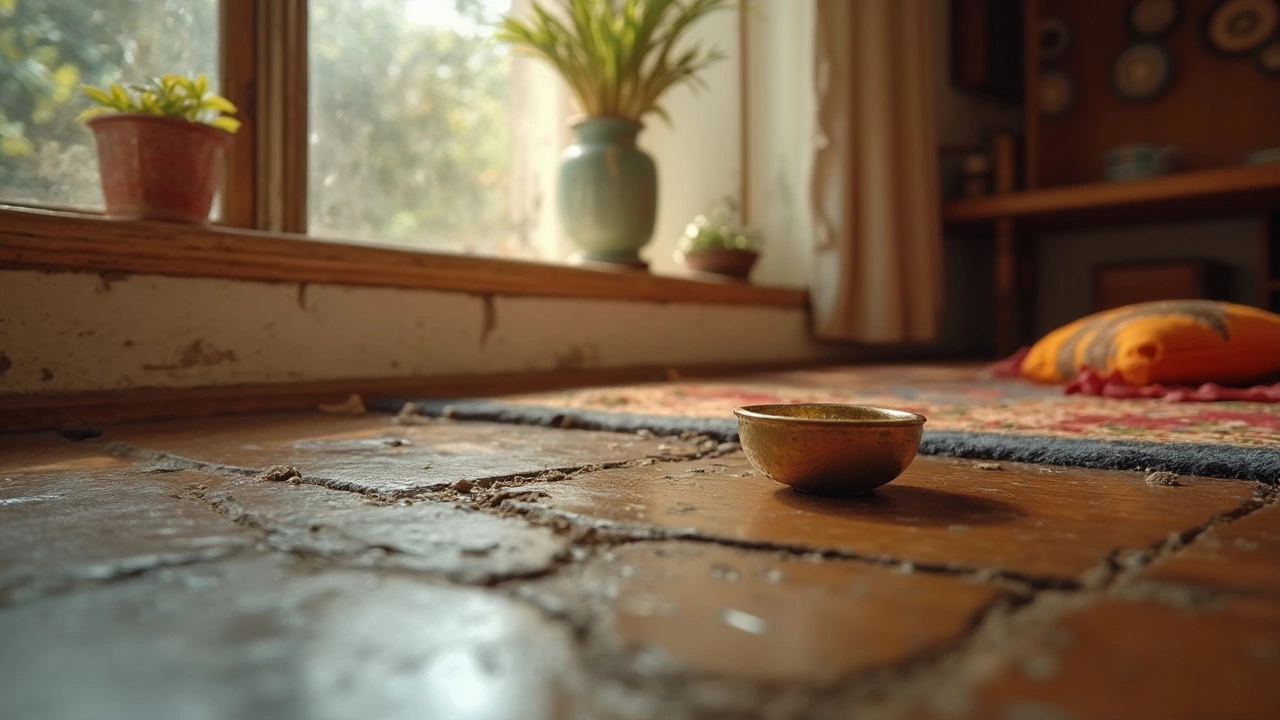Does Foundation Repair Decrease Home Value? The Real Impact on Your Property

Foundation problems can freak out any homeowner—nobody wants to see cracks in their walls or doors sticking for no reason. But let's get to the heart of the issue: does fixing your foundation actually make your home worth less?
Honestly, buyers notice foundation repairs, but not always the way you think. Some folks think it’s a red flag. Others see it as a relief, knowing that the problem’s been fixed and won’t pop up again soon. Way more important is how the repair was done, who did it, and whether there’s a solid warranty.
If you’re thinking about selling, don’t freak out yet. Most real estate agents agree—an honest fix beats hiding the problem any day. Lenders and inspectors hate surprises, but they love paperwork. That means receipts, engineer reports, and any warranty you can show.
- Why Foundation Repair Worries Homeowners
- What Really Happens to Your Home Value
- How to Handle Foundation Repairs the Smart Way
- Selling a Home After Foundation Fixes—What Works
Why Foundation Repair Worries Homeowners
No one likes to hear that their house needs foundation repair. The first thing most homeowners think about is the money, and honestly, foundation repair isn’t cheap. Depending on how bad things are, the bill can land anywhere from $3,500 up to $15,000 for serious jobs. That’s enough to make anyone nervous, especially if you’ve already sunk a lot of cash into your place.
But it’s not just the cost. There’s a real fear out there that fixing foundation problems will scare off buyers or wipe out your home’s value. It’s a legit concern, especially if you plan to sell soon. Nobody wants to list their home just to see low-ball offers rolling in because an inspector found old repairs—or, even worse, because the repairs weren’t done right the first time.
Here’s where things get extra stressful: Not all repairs are equal. Work done by a random handyman won’t ease any worries, but a licensed structural engineer’s stamp on your paperwork can really change the story. Buyers love proof that the job’s legit and covered by a warranty that actually means something.
If you’re curious about how many homes actually deal with this stuff, check out this little table. It breaks down some hard numbers on how common foundation issues really are, so you’ll know you’re not alone:
| Type of Home | Percent with Foundation Issues (USA) |
|---|---|
| Older than 50 years | ~28% |
| Built after 2000 | ~13% |
| Southern states (expansive clay soil) | ~40% |
| National average (all homes) | ~25% |
No matter where you live, the fear of foundation problems hits hard. It’s not just about cracks. People worry about paying for repairs again in the future, dealing with insurance (which rarely covers this stuff), and getting stuck with a home that won’t move on the market.
All these worries are real, but there are ways to tackle them head-on. Most importantly, understanding exactly what buyers, agents, and lenders look for after foundation repair can save you headaches—and help protect your property value.
What Really Happens to Your Home Value
A lot of people hear "foundation repair" and think their home's value will tank. That's not the whole story. Whether your house goes down in price, stays the same, or even gets a bump depends on how things are handled. Let’s break down what’s really at play here.
First off, buyers do ask about foundation repair—but what really matters is the quality of the work and proof it was done right. A slapdash DIY patch job scares people off, but a pro repair with a legit warranty is a different ballgame.
- If repairs are done by a respected contractor, buyers often feel better about moving forward.
- No repair and visible damage? That’s where you lose the most money—sometimes 10% to 20% below market value.
- Repairs with paperwork (warranties, engineer’s reports) show transparency and can actually boost buyer confidence.
How much value gets lost (or gained) depends on a few big factors:
- Neighborhood: If your area has lots of older homes, repairs are pretty normal and barely move the needle.
- Scope of Problem: Bigger issues that needed heavy lifting might still spook some buyers, so be upfront about what was done.
- Documentation: The more you have, the better—no one likes guesswork when spending hundreds of thousands of dollars.
A recent survey by the National Association of Realtors found that about 80% of buyers would consider a home with foundation repairs if there’s a transferable warranty. Here’s a quick look at what often happens after repairs, based on agent feedback and surveys:
| Situation | Impact on Value |
|---|---|
| No repair, visible damage | –10% to –20% below market |
| Professional repair, full documentation | –1% to –3%, sometimes no impact |
| High-quality repair w/ warranty in a high-demand neighborhood | Little to no impact, sometimes a slight increase |
If you try to hide or skip repairs and a buyer finds out during inspection, they’ll either walk away or demand a big price cut. If you fix the problem, offer the paperwork, and price fairly, most buyers will breathe easier—sometimes even more so than if you’d never had a problem, just because they know it’s been handled correctly.

How to Handle Foundation Repairs the Smart Way
When you spot a foundation issue, don’t just Google it and hope for the best. The smartest move is to get a pro involved—ideally a structural engineer. These guys work for you, not for a repair company, so you know you’re getting the real story about what your house actually needs.
Picking the right contractor is huge. Aggressive sales tactics or super-low bids are red flags—stick to companies with solid local reputations and good reviews. Check if they belong to the Foundation Repair Association or are certified by third-party groups. Insurance and permits aren’t optional. Ask to see paperwork up front.
Here are steps you don’t want to skip if you want your repairs to boost, not hurt, your home value:
- Get a detailed inspection report from a licensed structural engineer (not just the salesperson).
- Choose a repair contractor with actual references from homes like yours.
- Ask what repair methods they’ll use—like steel piers or helical piers (they last longer than concrete blocks).
- Only sign if you get a clear contract, timeline, cost, and a written warranty that actually covers something.
- Keep every receipt, report, permit, and warranty—your buyer (and their bank) will want to see these.
It’s smart to ask your contractor for a transferable warranty—it means the warranty goes with the house, not you. According to HomeAdvisor, foundation repair can actually increase home value by giving buyers peace of mind, especially if you can prove it’s fixed for good. A study by the National Association of Realtors found that 66% of buyers would walk away from a house with unresolved foundation problems, but most are happy with a fully documented fix.
If you have all the right documents and use a trustworthy contractor, foundation repairs become a selling point, not a liability." – Ben Kusmer, certified home inspector, May 2024
Check out the stats below to see how buyers feel about foundation repairs:
| Buyer Attitude | Unrepaired Foundation | Professionally Repaired |
|---|---|---|
| Walk Away | 66% | 14% |
| Want Price Drop | 28% | 22% |
| No Issue | 6% | 64% |
So in short—be picky about your contractor, keep all your docs, and let buyers know you did it right. You’re way more likely to keep your home’s value steady, or even bump it up a notch.
Selling a Home After Foundation Fixes—What Works
So you fixed your foundation and now you’re wondering how to sell without tanking your home’s value. It’s totally doable if you play it right. Here’s what matters most: buyers need honesty, proof that the problem’s fixed, and a sense of security moving forward. When you nail those three, most people won’t just walk away.
First thing—foundation repair history doesn’t have to ruin your home’s resale. According to a 2023 survey from the National Association of Realtors, homes with foundation repairs sell for as little as 2% less, and that’s only if buyers fear repeat problems. The trick is to kill that fear with real proof:
- Keep all invoices and detailed repair records. Name brands like Olshan, Ram Jack, or local structural engineers carry way more trust than mystery handymen.
- Transfer any repair warranties. Lifetime or transferable warranties can actually boost buyer confidence.
- Get a post-repair report from a licensed structural engineer for backup. Makes you look responsible and tells buyers there’s no lingering mess.
- Fix up what buyers see: patch interior cracks, repaint, and touch up landscaping affected by the repair. Cosmetic repairs make your home look well cared-for.
Transparency is your best friend here. Don’t hide the repair—bring it up before they find the paperwork or spot clues in the foundation. Here’s what buyers (and inspectors) care about most, according to Redfin and Zillow data:
| Factor | Impact on Sale |
|---|---|
| Professional Repair with Warranty | Boosts confidence, keeps value high |
| DIY or Unpermitted Repairs | Lowers trust, may decrease value |
| Cosmetic Signs (cracks, stains) | Can raise red flags, hurts resale |
| Full Disclosure | Helps prevent legal trouble, keeps deals on track |
If you want to go the extra mile, get your house inspected before listing. Fix minor things flagged on that inspection and show buyers you mean business. Most agents suggest pricing your home fairly—foundation repairs don't usually make people overpay, but homes move just as fast as similar houses without repairs if buyers feel safe.
End of the day, handling repairs the right way mostly means buyers see the house as “problem solved.” Give them proof and peace of mind, and you’ve got a smooth sale waiting.


